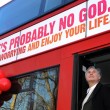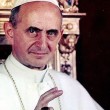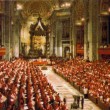Vatican II on Atheism: The Sources of Atheism
by Stephen Bullivant
Filed under Atheism

NOTE: This is the third post in Stephen Bullivant's series on atheists and the Catholic Church, particularly what the Second Vatican Council taught about atheism. Be sure to read Part 1 and Part 2. Also, his new book on this topic, Faith and Unbelief (Paulist Press), debuts this week. Check it out! In the last episode of my irregular 'Vatican II on atheism' series, we saw how a number of determined bishops - not least the Bishop of Rome - ensured that the Council took unbelief... Read More
Vatican II on Atheism: A More Fruitful Dialogue
by Stephen Bullivant
Filed under Atheism

Welcome to the second post in my little series 'Vatican II on atheism'. As noted last time, according to at least one reputable commentator, the Council's primary statement on the subject "may be counted among [its] most important pronouncements". In future posts, we'll be looking at Gaudium et Spes 19-21, as well as the separate statement on salvation in Lumen Gentium 14-16, in some details. So - let's face it—we've all got plenty of exegetical fun to look forward to. This post,... Read More
Atheists and the Catholic Church
by Stephen Bullivant
Filed under Atheism, Religion

"What has been is what will be, and what has been done is what will be done; there is nothing new under the sun" (Eccl 1:9). This famous observation of the Book of Ecclesiastes applies, to a certain extent, to the recent upsurge of Catholic interest in and—more importantly, serious engagement with—atheism. Popes announcing that "there should be a dialogue with those to whom...God is unknown", and that atheists are capable of "doing good" and "are able to be saved"? The Vatican... Read More
Foolishness!
by Stephen Bullivant
Filed under Atheism, Jesus

In the Bible, Psalms 14 and 53 both open with the statement: “Fools say in their hearts, ‘There is no God.’” Whatever this may tell us about unbelief in ancient Hebrew society, today it is not only, or predominantly, fools who are saying this. And they do not restrict their utterances to their hearts alone. Especially in the United States and Europe—the historic heart of “Christendom”—there are large (and growing) numbers of intelligent, educated, reasonable people... Read More






